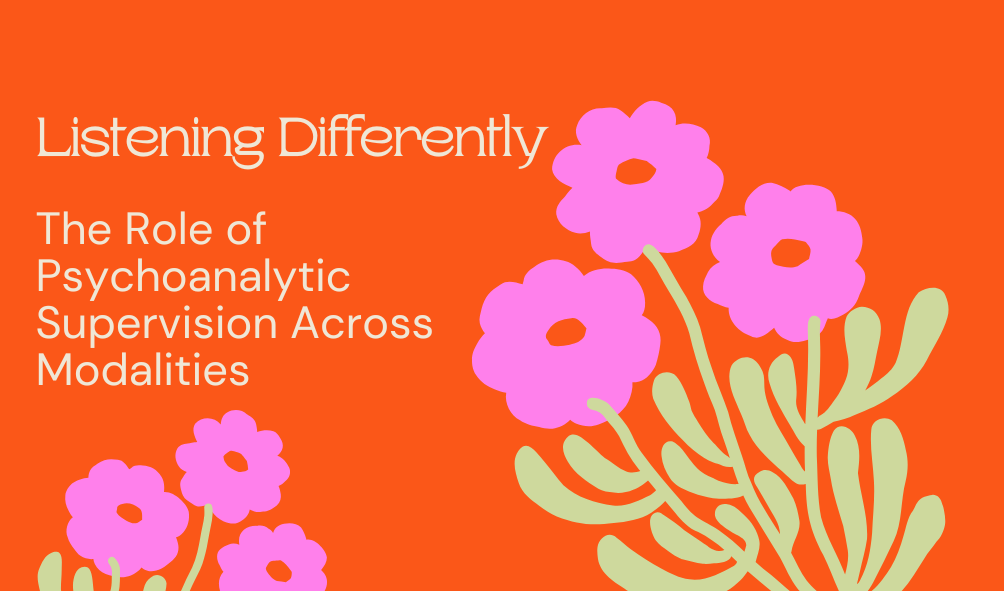In the consulting room, we are often taught to ask: What is the problem, and how can it be overcome? But sometimes, a patient says something that is enigmatic requiring a particular listening, exploration and interpretation. Or they keep returning to the same issue, even after many sessions. Maybe their words contradict their actions. Maybe as clinicians we find ourselves reacting more than we’d like, clinicians may feel frustrated, stuck, or too responsible. While the work in the room is about the patient, effective psychology supervision in Melbourne enables the therapy to stay open and receptive to what the patient brings. We make space in supervision to attend to these difficulties that emerge for your patient.
This is where psychoanalytic supervision can offer something different.
Even if you work from a different modality whether it’s CBT, ACT, EMDR, or narrative therapy, psychoanalytic supervision does not ask you to abandon your framework. Instead, it offers a space to listen differently, to pause before understanding, and to consider how the unspoken and what is not said or not known is perhaps influencing the treatment. Sometimes therapy reaches a point where the patient is overwhelmed with anxiety, such that a particular issue is difficult for them to speak. In supervision we attend to these points in your work with your clients.
Not Just Technique, But a Different Listening

Psychoanalysis is not about giving answers. It is about creating the conditions for truth to emerge from the patient’s own speech. In supervision, this principle extends to the clinician: what does your work with a particular patient bring up for you? What might you be caught in, without knowing it? Something that may be addressed in your own therapy.
Sometimes, what repeats in the therapy room a silence, a tension, a conflict says more than what is consciously spoken. A psychoanalytic supervisor is trained to help you hear these moments, not as failures, but as openings. Openings to what may be structuring the patient’s symptom, and your own position in relation to it. Sometimes the therapist is not able to hear the difficulty of the patient, because of what the patient’s speech may be touching for themselves.
How Can This Supervision Support Practitioners?
Clinicians working within cognitive frameworks encounter limits when working with a patient who doesn’t engage with homework, who intellectualises but remains emotionally absent, or who agrees with interventions but doesn’t make a change.
Psychoanalytic supervision helps practitioners explore:
- What might be resisted or unspeakable for the patient beneath the surface of cooperation
- Why certain interventions may fail to land, despite being theoretically sound
- How the therapist’s own position as helper, fixer, or knower might unintentionally reinforce a dynamic that keeps the patient remain in repetition
- What kinds of unconscious communications might be present in the patient’s language, symptom, or silence
Rather than changing the therapeutic modality, psychoanalytic supervision can enrich it, offering another layer of thinking conceptually, especially for cases that feel complex, or affectively charged. It helps the clinician work not just on the symptom, but also with what the symptom might be saying.
Why Seek Psychoanalytic Supervision?

Even experienced clinicians find themselves facing uncertainty. Sometimes psychologists say that a patient doesn’t improve. The sessions feel flat. A strong attachment develops, or resentment builds. Psychoanalytic supervision does not treat these as problems to eliminate rather treats them as material for exploration. Signs that something important is occurring in the relationship, in the structure of the patient’s desire, and in the place the clinician has come to occupy.
This kind of reflection is not always comfortable. But it is invaluable.
What Makes Psychoanalytic Supervision Different?
In psychoanalytic supervision, we ask questions like:
- What is the patient saying and what might be getting avoided or excluded, which may be due to longstanding family history of trauma which has fixed a particular narrative in the patient’s life
- What position have you, the psychologist, taken up in the therapy?
- How are you being addressed: as helper, judge, mother, friend?
- What are you doing when you intervene, how it is received, and what does it mean? We consider whether the therapist is acting based on the patient’s relationship to desire or based on therapist feelings.
Rather than focusing only on what to do, this mode of working together in supervision attends to how you are positioned, and what the structure of the clinical encounter itself reveals. It helps you notice your own assumptions, your reactions, and the small shifts in language that may change the entire direction of treatment.
You Don’t Have to Be a Psychoanalyst to Benefit
Many clinicians who come to psychoanalytic supervision are not psychoanalysts and do not want to become one. But they are curious. They may feel that something in their work is calling for a closer listening. Or perhaps they are noticing that familiar tools and formulations no longer seem to “work” for some patients.
Psychoanalytic supervision does not give recipes or steps. It’s not about measuring outcomes or managing – although those things have their place. It’s about supporting you to hear the unconscious in the patient’s speech and respond accordingly in a timely manner, and sometimes, in your own.
A Space That Respects the Clinician’s Desire
Supervision is not only about improving patient care. It’s also a space to ask: Why did I become a therapist? What do I want from this work? Over time, these questions become more subtle. A clinician may come to supervision not because they’re unsure how to help, but because they want to keep thinking to remain unsettled with new emerging thoughts or questions in a productive way.
In a field where burnout is common and even rewarded by capitalist discourses, psychoanalytic supervision creates space for something different to that, provides a space to sustain curiosity, preserve doubt, and stay connected to the real ethical challenge of working with a speaking being.
Working With Me
In my practice in Hawthorn, Kew, Belgrave (and sometimes online), I provide psychoanalytic supervision for clinicians from all modalities. My background spans public and private settings, with experience in addiction, psychosis, trauma, and culturally diverse communities. As a psychologist in Melbourne with a Lacanian orientation, I listen closely to the words, hesitations, and repetitions in both the patient’s and clinician’s speech.
In supervision, I don’t tell you what to do, supervision sessions are driven by the question or thoughts or cases that you bring. I may say which areas in your work with your patient may require further exploration which may be aspects of your patient’s history, or symptoms. I sit with you to think about what’s happening and what might be at stake. I support you to develop your own position as a clinician in your own work with each patient, to find your own way of working ethically, with each singular person who enters your room. You may wish to commence your own analysis at some point for having your own ethical psychoanalytic listening.
In Conclusion
Therapy is not always clear. The patient’s desire can be opaque. Our responses can be surprising. Psychoanalytic supervision invites you to stay with this ambiguity not to escape it, but to learn from it.
Whether you’re early in your career or years into practice, you don’t have to do this work alone. Sometimes, having a space to listen to yourself can make a difference.
